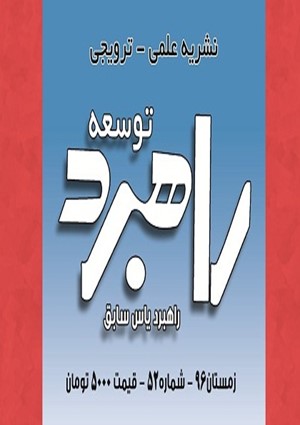Formal Education and Agricultural Productivity of Labor: Evidence from Iran, MENA and World
Subject Areas :
Keywords: Education, Productivity, Agriculture,
Abstract :
The basic pillars of human capital theory have been based upon the importance of farmers' education in increase of their productivity. In effect, the argument is that educated farmers can produce new or more products. The purpose of this paper is to investigate and test the impact of formal education in the whole of society, not exclusively in farm households, on productivity of agriculture sector. To do this, three samples including Iran, Middle East and North Africa (MENA) and whole of the world (158 countries) have been used respectively. The prominent feature of current research is use of various measures of education including its quality. Findings, as a whole, suggest that quantitative and qualitative increase of education helps to the rising of agricultural productivity. Therefore, spending resources in education particularly as constructing educational equipment relevant to agriculture in farm regions is an investment with return
اسفندیاری، هنگامه؛ نجفی، بهاالدین و سید نعمت الله موسوی(1395)، نقش بخشهای اقتصادی در رشد اقتصادی ایران با تأکید بر بخش کشاورزی، فصلنامه تحقيقات اقتصاد كشاورزی، 8(1): 100-85.
امامی میبدی، علی(1390)، کارایی و بهره¬وری از دیدگاه اقتصادی، انتشارات دانشگاه علامه طباطبایی، تهران.
باریکانی، سیدحامدسادات و بهاره ایران¬نژاد(1392)، بررسی جایگاه بخش کشاورزی در اقتصاد ایران: نگاهی دوباره به نظریه محوریتبخش کشاورزی، فصلنامه اقتصاد کشاورزی و توسعه، 21(81): 177-153.
بنی¬اسدی، مصطفی و حجت ورمزیاری(1393)، بررسی عوامل مؤثر بر بهره¬وری نیروی کار کشاورزی، توزیع درآمد و فقر در مناطق روستایی ایران، فصلنامه روستا و توسعه، 17(4): 23-1.
تودارو، مایکل(1387)، توسعه اقتصادی در جهان سوم، ترجمه غلامعلی فرجادی، انتشارات کوهسار، تهران.
شاه¬آبادی، ابوالفضل و مصطفی امیری(1393)، تأثیر انباشت تحقیق و توسعه داخلی و سرریز تحقیق و توسعه خارجی بر رشد بهره¬وری کل عوامل تولید بخش کشاورزی ایران، فصلنامه مطالعات اقتصادی کاربردی ایران، 3(9): 114-93.
علی¬بیگی، امیر حسین و رضوان قنبرعلی(1392)، بررسی اثر برنامه ترویج کشاورزی بر دانش و بهره¬وری روستاییان گندمکار شهرستان کرمانشاه، فصلنامه اقتصاد فضا و توسعه روستايي، 2(٣): 68-57.
قنادان، محمود(1391)، جوایز نوبل اقتصاد، انتشارات دانشگاه تهران، تهران.
گریفین، کیت(1384)، راهبردهای توسعه اقتصادی، ترجمه حسین راغفر و محمدحسین هاشمی، نشر نی، تهران.
گیلیس، مالکوم؛ پرکینز، دوایت؛ رومر، مایکل و دانلد اسنودگراس(1385)، اقتصاد توسعه، ترجمه غلامرضا آزاد (ارمکی)، نشر نی، تهران.
موسوی، سیدروح الله و جواد میرمحمدصادقی(1391)، عوامل مؤثر بر بهره¬وری نیروی انسانی در تولید محصولات عمده زراعی بخش مرکزی شهرستان ممسنی، فصلنامه تحقيقات اقتصاد كشاورزی، 4(2): 174-155.
مهربانی، وحید(1394)، تحلیل اقتصادی آموزش، انتشارات سمت، تهران.
Asfaw, A. and Admassie, A. (2004). The Role of Education on the Adoption of Chemical Fertiliser under Different Socioeconomic Environments in Ethiopia, Agricultural Economics, 30: 215–228.
Azhar, R. A. (1991), Education and Technical Efficiency during the Green Revolution in Pakistan, Economic Development and Cultural Change, 39(3): 651-665.
Bowman, M. J. (1988), Schultz, In: The New Palgrave: A Dictionary of Economics, Vol, 4, Edited by: Eatwell, J., Milgate, M. and Newman, P., Macmillan Press Limited London and Basingstoke.
Foster, A. D. and Rosenzweig, M. R. (1996), Technical Change and Human-Capital Returns and Investments: Evidence from the Green Revolution, American Economic Review, 86(4):931-953.
Huffman, W. E. (1974), Decision Making: The Role of Education, American Journal of Agricultural Economics, 56(1): 85-97.
Jamison, D. T. and Moock, P. R. (1984), Farmer Education and Farm Efficiency in Nepal: The Role of Schooling, Extension Services, and Cognitive Skills, World Development, 12(1): 67-86.
Lockheed, M. E., Jamison, T. and Lawrence, J. L. (1980), Farmer Education and Farm Efficiency: A Survey, Economic Development and Cultural Change, 29(1): 37-76.
Nelson, R. and Phelps, E. (1966), Investment in Humans, Technological Diffusion, and Economic Growth, American Economic Review, 56(1/2): 69-75.
Onphanhdala, P. (2009), Farmer Education and Agricultural Efficiency: Evidence from Lao PDR, GSICS Working Paper Series, No. 20, Kobe University.
Padhy, C. and Jena, B. K. (2015), Effect of Agricultural Education on Farmers Efficiency: A Review, International Journal of Engineering Technology, Management and Applied Sciences, 3(2): 247-258.
Phillips, J. M. and Marble, R. P. (1986), Farmer Education and Efficiency: a Frontier Production Function Approach, Economics of Education Review, 5(3): 257-264.
Schultz, T. W. (1960), Capital Formation by Education, Journal of Political Economy, 68(6): 571-583.
Schultz, T. W. (1961), Investment in Human Capital, American Economic Review, 51(1): 1-17.
Schultz, T. W. (1964), Transforming Traditional Agriculture, Yale University Press, New Haven and London.
Schultz, T. W. (1971), Investment in Human Capital: The Role of Education and of Research, Free Press, New York.
Schultz, T. W. (1981), Investing in People: The Economics of Population Quality, University of California Press, Berkeley and Los Angeles.
Singh, R. D. and Santiago, M. (1997), Farm Earnings, Educational Attainment, and Role of Public Policy: Some Evidence from Mexico, World Development, 25(12): 2143-2154.
Welch, F. (1970), Education in Production, Journal of Political Economy, 78(1): 35-59.
World Bank (2012), World Development Indicators, Green Press Initiative, Washington, D.C.
World Bank. www.worldbank.org
Yang, D. T. (1997). Education in Production: Measuring Labor Quality and Management. American Journal of Agricultural Economics, 79(3): 764-772.

